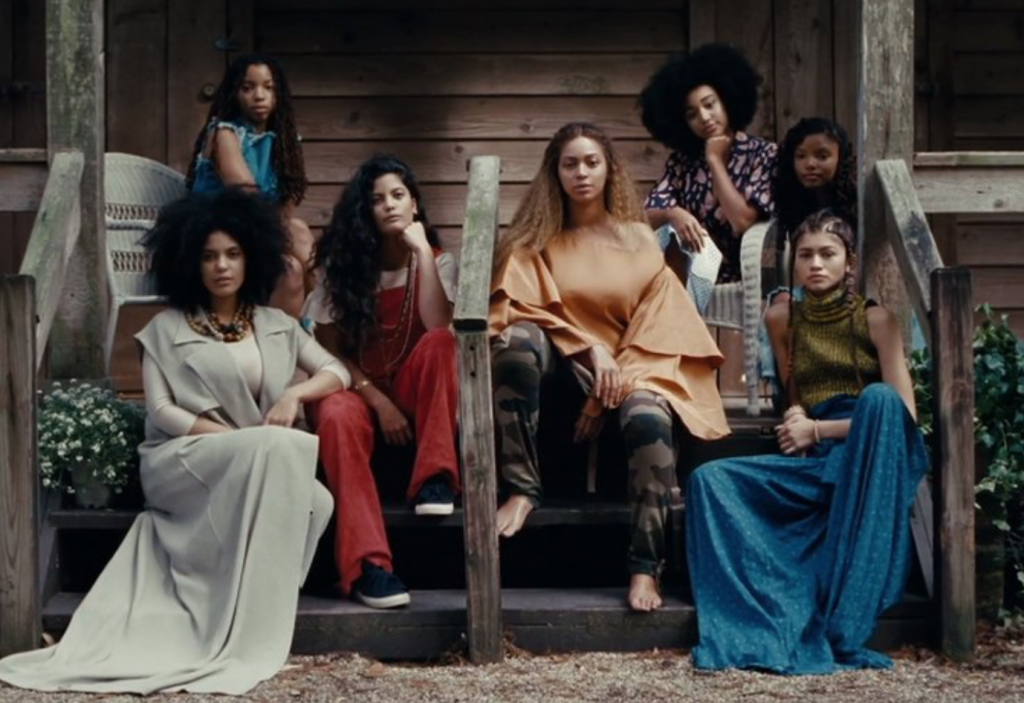“I think of lovers as trees, growing to and/ from one another searching for the same light . . . i ask did you ever love me?/ you say of course, of course so quickly/ that you sound like someone else” – Warsan Shire
Beyoncé dropped an album last night. Actually it’s not just an album, it’s not just a video, it’s not like anything you’ve ever heard or seen. LEMONADE premiered on HBO as a visual album and it’s a masterpiece of creativity, boldness, honesty and purpose. It’s an ode to generations of black women. And, in a more personal sentiment, it’s the story of a marriage.
“Are you cheating on me?” It’s a jarring question coming from the Queen after she’s jumped from the edge of a building and plunged into a bedroom filled to the ceiling with water. From there, she struts out into the streets in a flowing canary-yellow Roberto Cavalli dress, and later armed with a baseball bat, she smashes a number of vintage parked cars. Appropriately, this section is titled “Anger.”
The video follows the Kübler-Ross model of grief in titled sections from denial to anger and Beyoncé adds some of her own touchstones of course, like reformation, hope and redemption. All the while, she lends her voice to the words of Somali-British poet, Warsan Shire, whose stanzas appear between tracks.
As Beyoncé continues with her anger, she’s aided by Jack White in “Don’t Hurt Yourself,” which samples Led Zeppelin’s “When the Levee Breaks.” Later, Beyoncé lies on the field of the New Orleans Superdome, which famously housed hundreds in the wake of Hurricane Katrina after the levees broke. As “Anger” continues, many from the Bey-hive took to Twitter to genuinely question whether this visual album would also double as an announcement of its Queen’s separation from Jay-Z, especially when Beyoncé, head braided and fur coat on, took off her wedding band, threw it at the camera, and declared, “If you try this shit again. You gon’ lose your wife.”
She transitions with the touch of a music-box version of Tchaikovsky’s Swan Lake Suite and some spoken word: “Rest in peace my true love, who I took for granted. Most bomb pussy, who because of me sleep evaded. Her shroud is loneliness, her god was listening. Her heaven will be a love without betrayal. Ashes to ashes, dust to side chicks.” Goddamn. Fire.
There is no genre that is safe on the album. Some expected a hip-hop centered album especially with prior releases like “7/11” and “Formation,” but Beyoncé turned to samples from Led Zeppelin to the Yeah Yeah Yeahs to Isaac Hayes and Animal Collective. Along with Jack White the album also features The Weeknd, James Blake and Kendrick Lamar.
It’s not until the tenth song in the album, which appears at around the 40 minute mark in the visual album, that the tone shifts. We’ve traveled through denial, anger, apathy, emptiness, accountability, reformation and arrived at forgiveness. Finally appears the man that’s the cause of the strife in at least one layer of this complexly woven tale of generational mistrust—Jay Z. In “Sandcastles,” one of the few ballads on the album, Beyoncé croons, “And your heart is broken cause I walked away/ Show me your scars and I won’t walk away/ And I know I promised that I couldn’t stay, baby/ Every promise don’t work out that way.” It seems that things will work out despite the strife as the visual album ends on a hopeful and loving note with “All Night,” as Beyoncé whispers in the outro, “How I missed you, my love.”
“‘Here,’ she said, ‘in this here place, we flesh; flesh that weeps, laughs; flesh that dances on bare feet in grass. Love it. Love it hard. Yonder they do not love your flesh.” – Toni Morrison
There’s a heartbreaking moment in LEMONADE when a woman with short, fiery red hair, holds a framed photo of a young man in a graduation cap. A single tear falls down her right cheek. She’s Lesley McSpadden, the mother of Michael Brown. Another woman clutches a framed photo of her son. It’s Sybrina Fulton, mother of Trayvon Martin. And another—Gwendolyn Carr, holds the image of her son, Eric Garner. These moments appear during the anthemic “Freedom,” which fittingly features Kendrick Lamar, whose song “Alright” is an anthem of the Black Lives Matter Movement.
LEMONADE, as much as it is about Bey and Jay, is a celebration of blackness—specifically black womanhood and the generations of lemonade black women have squeezed from the lemons they were served. In the middle of “Don’t Hurt Yourself” are the words of Malcolm X—“The most disrespected person in America, is the black woman. The most unprotected person in America is the black woman.”
The black women in LEMONADE are some of the most respected women in America. The women with cameos in the visual album include Serena Williams, arguably the most dominant athlete in sports; fashion model Winnie Harlow; actresses Amandla Stenberg, Zendaya and Academy Award nominee Quvenzhané Wallis; YouTube stars Chloe and Halle Bailey; French Afro-Cuban duo Ibeyi and ballerina Michaela DePrince. It’s Black Girl Magic at its finest, most dramatic and inspiring.
The women appear throughout in couture outfits in Southern gothic settings as the camera pans from a large estate to its trees. Trees have long held symbolic meaning throughout African American art. In Beloved by Toni Morrison, widely considered the greatest achievement in modern American literature, Morrison uses trees to represent hope in their blossoming, but also as a symbol of loss and despair. The same trees that blossom are the trees that hold the bodies of the lynched on their limbs. In LEMONADE, Beyoncé and her Black Girl Magic crew sit atop those limbs, heads held high, regal and empowered.
LEMONADE is a reminder to black women everywhere to love your flesh. Love it. Love it hard.




Comments are closed.